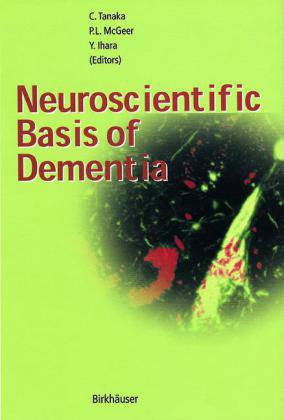
- Retrait gratuit dans votre magasin Club
- 7.000.000 titres dans notre catalogue
- Payer en toute sécurité
- Toujours un magasin près de chez vous
- Retrait gratuit dans votre magasin Club
- 7.000.000 titres dans notre catalogue
- Payer en toute sécurité
- Toujours un magasin près de chez vous
Neuroscientific Basis of Dementia
Patrick L McGeer, Yasuo Ihara, Chikako Tanaka
Livre relié | Anglais
84,45 €
+ 168 points
Description
Special lectures.- A tale of protein kinase C and membrane lipid signaling.- Complement, neuroinflammation and neuronal degeneration in Alzheimer disease.- Memory and its impairment.- Neurobiological mechanisms by which emotional arousal influences long-term memory formation.- Amygdalar damage and memory impairment in Alzheimer's disease.- Neural substrate for spatial memory in the monkey hippocampus.- Involvement of CaM kinase II and mitogen-activated protein kinase in hippocampal long-term potentiation.- Pathogenesis of dementia - tau.- Transgenic mice overexpressing the shortest human tau isoform develop a progressive tauopathy.- Tau and neurodegenerative disease: genetics and pathogenetic mechanisms.- Tau mutations altering splicing of tau exon 10 in japanese frontotemporal dementia.- Amyotrophic lateral sclerosis/parkinsonism-dementia complex of the Kii peninsula of Japan (Kii ALS/PDC) may be a familial tauopathy. Epidemiological trends, clinical features, neuropathology and molecular genetics.- Senile dementia of the neurofibrillary tangle type (SD-NFT): a clinical, neuropathological and molecular genetic study.- The dual role of tau in cell polarisation and organelle trafficking.- Rearrangement of microtubule networks by tau bearing missense mutations.- Possible role of tau phosphorylation on ER membrane in Alzheimer pathology.- Pathogenesis of dementia - synuclein.- Pathogenesis of dementia: updating the role of synuclein pathology in sporadic and hereditary Alzheimer's disease.- ?-Synuclein/NACP and neurodegeneration.- ?-Synuclein fibrillogenesis as target for drug development.- Pathogenesis of dementia - presenilin and amyloid.- Genetics of early-onset Alzheimer disease.- Lessons from presenilin domain analysis: endoproteolytic processing and enhanced A?42 production mediated by FAD-linked variants.- Amyloid and presenilins in the pathobiology of Alzheimer's disease.- Role of presenilin in APP processing and A? production.- Impairment of response to ER stress in presenilin 1 mutant.- Mechanism of neuron death in Alzheimer's disease.- Notch3 gene in CADASIL syndrome: mutation frequencies in Japanese and its expression and processing.- Etiological roles of A? and carboxyl terminal peptide fragments of amyloid precursor protein in Alzheimer disease.- Amyloid ?-protein granules in glial cells in Alzheimer's disease brain.- Amyloid ? induces phosphorylation and translocation of MARCKS through tyrosine kinase-activated PKC-? signaling pathway in microglia.- Amyloid ?-protein accumulation in the human brain during aging.- Molecular mechanisms underlying initiation of amyloid fibril formation.- Catabolism of amyloid-? peptide in brain parenchyma.- Diagnosis and therapeutics of dementia.- Lessons in familial Alzheimer's disease.- Biological markers for differential diagnosis of Alzheimer's disease and related disorders.- Dietary factors and the risk of Alzheimer's disease: a low fish consumption and a relative deficiency of ?-3 polyunsaturated fatty acids.- Risk factors for dementia.- New therapeutic approaches to Alzheimer's disease.
Spécifications
Parties prenantes
- Auteur(s) :
- Editeur:
Contenu
- Nombre de pages :
- 324
- Langue:
- Anglais
Caractéristiques
- EAN:
- 9783764362058
- Date de parution :
- 25-01-01
- Format:
- Livre relié
- Format numérique:
- Genaaid
- Dimensions :
- 156 mm x 234 mm
- Poids :
- 630 g







